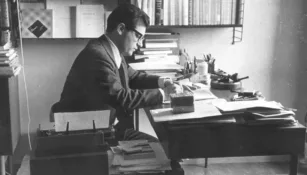CONTRIBUTI / 6 / Chiara Maciocci
Caroline von Wolzogen and the Kleinöffentlichkeit: Authoritative strategies of existence between anonymity and relationality
This contribution aims to account for the role of the writer Caroline von Wolzogen in the sociocultural context of the Weimar Classicism. Specifically, an attempt will be made to focus on the writer’s choice to publish the first part of her most successful novel, Agnes von Lilien (1798), under anonymity, and how this choice influenced the reception of the novel, which was initially attributed to both Goethe and Schiller. An attempt will therefore be made to thematise this choice in relation to the context of dense relationships in which the author inserted herself – the context of the salons, characterised by a semi-public dimension, or Kleinöffentlichkeit – in order to fully understand the value of the “existence strategy” that the use of anonymity could represent for women writers. The ultimate aim of this investigation will also be to restore the value of testimony, of a marginal and thus privileged point of view, of Caroline von Wolzogen’s biographical and editorial parabola on a founding epoch for German and European literature such as that of the years around 1800.
References
Primary sources
- Von Wolzogen, C. 1998. Agnes von Lilien, Hrsg. P. Boerner, Hildesheim, Georg Olms 1988.
Secondary literature
- Anderson, B. e Zinsser, J. 1993. Le donne in Europa. Nelle corti e nei salotti, Bari, Laterza.
- Becker-Cantarino, B. 1987. Der lange weg zur Mündigkeit. Frau und Literatur (1500-1800), Stuttgart, J. B. Metzler.
- Brandel, A., The Art of Conviviality, «Journal of Ethnographic Theory», 6, 2016, pp. 323-343.
- Daley, M. 2020. The Illegitimacy of Authorship and the Legitimization of Passion in Agnes von Lilien, in E. Krimmer (ed.),Writing the Self, Creating Community: German Women Authors and the Literary Sphere 1750-1850, Woodbridge, Boydell and Brewer, pp. 207-229.
- Daub, A. 2019. Scenes from a Marriage: Friedrich and Dorothea Schlegel, Collaboration as Symphilosophy and After, in L. Deiulio and J. B. Lyon (eds.), Gender, Collaboration, and Authorship in German Culture: Joint Literary Ventures 1750–1850, New York 2019, pp. 125-154.
- Fattorini, V. 2012. Introduzione, in Caroline Schlegel-Schelling: «Ero seduta qui a scrivere». Firenze, Firenze University Press.
- Gallagher, C. 1994. Nobody’s Story: The Vanishing Acts of Women Writers, Berkeley, University of California Press.
- Gilbert, S. and Gubar, S. 1984. The Madwoman in the Attic: The Woman Writer and the Nineteenth-Century Literary Imagination, New Haven, Yale University Press.
- Haller-Nevermann, M. 2018. Mehr ein Weltteil, als eine Stadt. Berliner Klassik und ihre Protagonisten, Berlin, Kiepenheuer and Witsch.
- Hahn, B. 1991. Unter falschem Namen. Von der schwierigen Autorschaft der Frauen, Frankfurt a.M., Suhrkamp.
- Hammerstein, K. M. 1993. Sophie Mereau-Brentano. Freiheit – Liebe – Weiblichkeit: Trikolore sozialer und individueller Selbstbestimmung um 1800 [Beiträge zur neueren Literaturgeschichte], Heidelberg.
- Henrich, D., 1991. Konstellationen. Probleme und Debatten am Ursprung der idealistischen Philosophie (1789-1795), Stuttgart, Klett-Cotta.
- Higonnet, M. R. 2018. Borderwork. Feminist Engagements with Comparative Literature, Ithaca-London, Cornell University Press.
- Kord, S. 1996. Sich einen Namen machen. Anonymität und weibliche Autorschaft 1700-1900, Stuttgart-Weimar, J. B. Metzler.
- Koselleck, R. 1972. Über die Theoriebedürftigkeit der Geschichtswissenschaft, in W. Conze (Hrsg.), Theorie der Geschichtswissenschaft und Praxis des Geschichtsunterrichts, Stuttgart, Klett.
- Kraus, H. 2019. Neue Fragen an ein altes „Problem“: Anonymität um 1800, «Zeitschrift für Germanistik», 29, pp. 169-177.
- Krimmer, E. 2005. German Women Writers and Classicism, in S. Richter (ed.), The Literature of Weimar Classicism, New York, Camden House, pp. 237-264.
- Mulsow, M. und Stamm, M. (Hrsg.). 2005. Konstellationsforschung, Berlin, Suhrkamp Verlag.
- Papst, S. 2011. Autorschaft und Anonymität in Problemaufriss, in Autorschaft und Anonymität: Zur Literatur- und Rechtsgeschichte der Namenlosigkeit, Berlin, Walter de Gruyter.
- Richter, S. 2012. Weimarer Heteroclassicism: Wilhelm von Humboldt, Caroline von Wolzogen, and the Aesthetics of Gender, «Publications of the English Goethe Society», 81 (3), pp. 137-151.
- Rigby, K. 2023. Sympoesie. Potentiation, Conviviality and Collaboration in Romantic Ecopoetics, in R. Borgards et. al. (Hrsg.), Romantische Ökologie. Vielfältige Naturen um 1800, Berlin, pp. 207-225.
- Ritter Santini, L. 1988. I cassetti di Rahel e le chiavi di Hannah, prefazione a H. Arendt, Rahel Varnhagen. Storia di un’ebrea, Milano, Il Saggiatore, pp. 9-55.
- Sapegno, M. S. 2007. Uno sguardo di genere su canone e tradizione, in A. Ronchetti, e M. S. Sapegno (a cura di), Dentro/fuori, sopra/sotto. Critica femminista e canone letterario negli studi di italianistica, Ravenna, Longo Editore, pp. 13-23.
- Secci, L. 2007. Dal salotto al partito. Scrittrici tedesche tra rivoluzione borghese e diritto di voto (1848-1918), Roma, Artemide.
- Sengle, F. 1971. Biedermeierzeit: Deutsche Literatur im Spannungsfeld zwischen Restauration und Revolution 1815-1848, Stuttgart, Stuttgart Metzler.
- Showalter, E. 1977. A Literature of Their Own: British Women Novelists From Brontë to Lessing, Princeton, Princeton University Press.
- Tedeschini, M. (a cura di) 2020. La ricerca per costellazioni. Metodo, scostamenti, casi di studio, Roma, Istituto Italiano di Studi Germanici.
- Theml, C. 1996. “Größe zu lieben war meine Seligkeit”. Biographische Skizzen zu Caroline von Beulwitz-Wolzogen, Jena, Jenzig Verlag Gabriele Köhler.
- Tornieporth, G. 1977. Studien zur Frauenbildung. Ein Beitrag zur historischen Analyse lebensweltorientierter Bildungskonzeptionen, Weinheim-Basel, Beltz.
- Weber-Kellermann, I. 1974. Die deutsche Familie. Versuch einer Sozialgeschichte, Frankfurt a.M, Suhrkamp.
- Weber, M. 1989. Ehefrau und Mutter in der Rechtsentwicklung. Eine Einführung, Tübingen, Mohr Verlag.
- Weigel, S. 1983. Der schielende Blick. Thesen zur Geschichte weiblicher Schreibpraxis, in I. Stephan und S. Weigel (Hrsg.), Die verborgene Frau. Sechs Beiträge zu einer feministischen Literaturwissenschaft, Berlin, Argument Verlag.
- Weissberg, L. 2016. Der jüdische Salon in Berlin (und Wien) um 1800, in H. O. Horch (Hrsg.), Handbuch der deutsch-jüdischen Literatur, Berlin, Walter de Gruyter, pp. 60-69.

